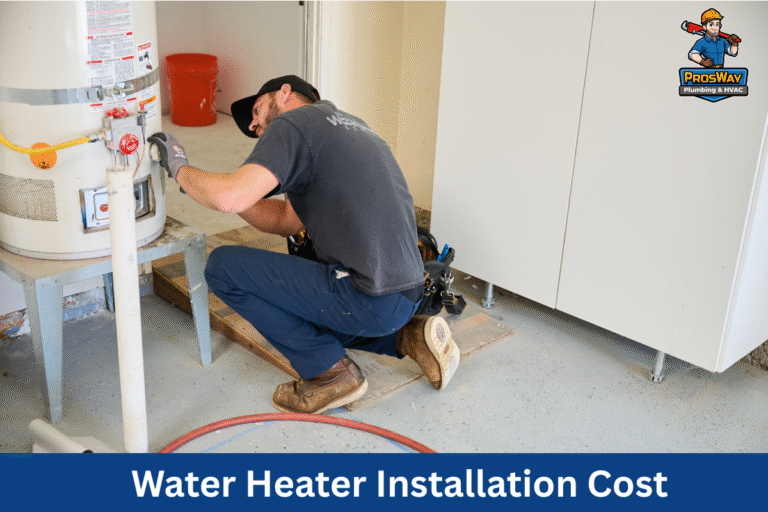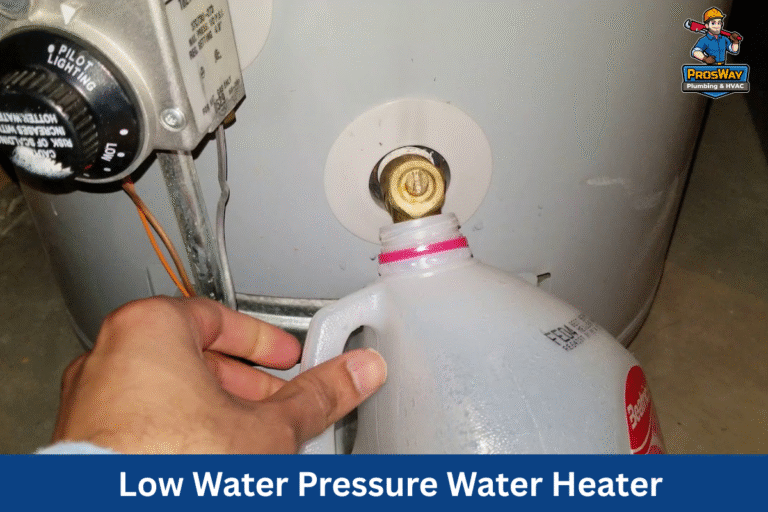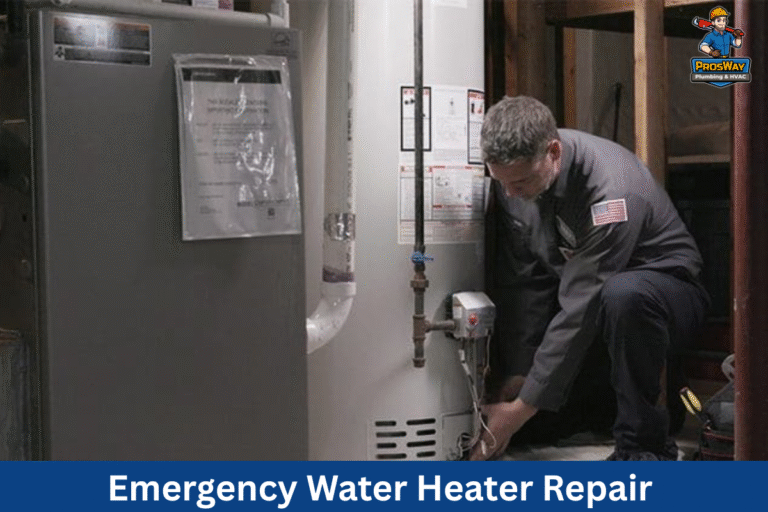At ProsWay Plumbing & HVAC, we’ve seen how a damaged sewer line can quickly escalate from a hidden issue to a major threat to your home’s structure, health, and value. For Northern New Jersey homeowners, early detection and timely repair are key to avoiding serious consequences like foundation cracks, mold growth, and costly restoration.
This article will outline what to look for, what’s at stake, and how to act fast. Using real examples from our service area, we explain how aging pipes and corrosion lead to failures, and what you can do today to protect your home.
What Are the Signs and Causes of a Failing Sewer Pipe?
The first step in managing sewer line problems is recognizing the subtle warning signs that indicate a compromised pipe. Early indicators are essential for prompt intervention.
Often, homeowners notice minor issues long before a catastrophic failure occurs. Common early signs include occasional gurgling sounds from drains and unexpected sewer gas odors.
These signals directly point to underlying blockages, pipe breakages, or groundwater infiltration through compromised seals.
Warning Signs Your Sewer Line May Be Failing
The very first hint of failure may be persistent drainage problems. Slow-draining sinks, bathtubs, or toilets suggest a blockage or developing break.
This may come with unpleasant odors that do not clear even with extra ventilation or cleaning. Gurgling sounds may also be heard when air is forced through trapped water or debris.
Consider effectively addressing the situation if you experience issues. Other warning signs include unexplained wet spots on the property, especially in areas without expected water accumulation.
Damp spots, saturated soil near the foundation, cracks or uneven areas on driveways, and more frequent or simultaneous plumbing backups can indicate a broader problem in the system.
These signs should never be ignored. Early detection via a professional inspection can prevent major repair costs and health risks. Routine maintenance can catch problems before they escalate.
What Factors Commonly Cause Sewer Line Ruptures?
Multiple factors lead to the degeneration and eventual rupture of sewer lines. Age is a significant factor; even well-installed pipes deteriorate over time due to constant wastewater exposure.
Older pipes, such as those made from clay or cast iron, are prone to corrosion and cracking. Severe weather—heavy rainfalls and harsh freeze-thaw cycles in northern New Jersey—can further stress vulnerable pipes.
Tree roots also play a critical role. As trees grow, their roots seek water and nutrients and can infiltrate small cracks in sewer pipes. Over time, these roots expand and break open the pipe from within.
Improper installation or low-quality materials can contribute to early failure; flawed alignment, slope, or inadequate support can compromise the structure from the start.
Human activity, such as construction, nearby excavations, or routine landscaping, can disturb the soil around pipes, leading to misalignment or joint separation.
Immediate Steps Upon Suspecting a Sewer Line Breach
If you suspect a compromised sewer line, take immediate steps to minimize further damage. First, stop using water fixtures that might worsen the leak.
Limit the use of showers, sinks, and toilets to reduce water flow into the system. Next, contact a reliable sewer line professional for an immediate inspection and diagnosis, even if the signs appear minor.
Document issues by taking photographs of damp areas, unusual cracks, or any evidence of water or sewage infiltration. This documentation is useful for the professional assessment.
If sewer gas odor becomes strong or visible evidence of a breach exists, ensure proper ventilation by opening windows and doors. Do not attempt repairs yourself unless you are experienced.
Inform your neighbors if you suspect a wider issue affecting multiple properties. Awareness may prompt them to check their systems, helping to prevent a larger municipal problem.
If available, use a backup sump pump or emergency water shut-off system to temporarily control the situation. Taking these immediate steps protects your property from further water damage.
What Damage Can a Broken Sewer Line Cause to Your Property?

A broken sewer line can inflict significant damage on your property, from structural issues to severe landscape degradation.
Many homeowners underestimate the harm a compromised sewer system may cause. In northern New Jersey properties, even a small leak may quickly escalate into extensive damage.
How Can a Broken Sewer Line Affect Your Home’s Structure?
The most immediate concern when a sewer line fails is direct structural damage. When sewage or wastewater escapes into the soil, it erodes the foundation or structure of your home.
This erosion gradually undermines the foundation’s stability, leading to cracks in walls, floors, and the foundation itself. Minor cracks can quickly expand into major failures, threatening safety.
Continuous water seepage weakens concrete and soil, causing uneven settling. This may result in sloping floors, jammed doors and windows, and visible exterior wall cracks.
In severe cases, the cumulative damage may require expensive foundation repairs or complete replacement, representing a major financial burden for homeowners.
Older sewer systems—often made of clay or cast iron—are more vulnerable to cracking under pressure. Once a crack forms, deterioration accelerates.
Homes built on unstable soil face even greater risks, especially in areas with frequent freeze-thaw cycles. Professional inspectors using imaging cameras and soil tests can precisely gauge the extent of damage.
Damage to Landscaping and Outdoor Areas
A broken sewer line can severely damage outdoor areas. Sewage discharge can kill trees, shrubs, and flowers, degrading lawns, gardens, and outdoor living spaces.
Contaminated water often leaves behind unsightly wet patches, algae, and foul odors that hurt your property’s curb appeal.
When sewer water saturates the soil, it disrupts the natural nutrient balance and pH levels, making the soil inhospitable for plant growth.
Damage to landscaping not only reduces aesthetic value but can also lead to indirect financial losses when potential buyers or appraisers devalue the property.
What Is the Financial Impact of Sewer System Failure?
The financial burden of a broken sewer line extends far beyond immediate repair costs. Homeowners must consider cascading effects on property value and potential fines if environmental contamination is severe.
Often, hidden costs related to cleanup, mold remediation, and preventive measures compound the financial impact.
A comprehensive cost assessment should include tangible expenses such as repair, cleanup, and structural fixes, as well as intangible factors like lost peace of mind and decreased marketability.
What Are the Health and Environmental Risks of a Faulty Sewer Line?
Defective sewer lines trigger several health hazards and environmental issues that extend far beyond property damage.
When wastewater escapes, it releases pathogens and chemicals that compromise indoor air quality, posing significant risks to both personal health and community well-being.
What Dangers Come From Sewer Gas Indoors?
Another concern is the accumulation of sewer gas indoors. Composed primarily of methane, hydrogen sulfide, and ammonia, even low levels of these gases can cause respiratory issues.
In extreme cases and poorly ventilated spaces, high concentrations may be life-threatening. Persistent foul odors serve as a warning sign of sewer gas buildup, making it critical to ensure proper ventilation.
Contamination of Ground Soil and Water Resources
A broken sewer line can allow wastewater to leak into the surrounding soil, contaminating it with bacteria, heavy metals, and chemical residues.
This contamination can spread to local water resources, including wells, streams, and lakes, affecting both human consumption and local ecosystems.
Contaminated soil may hinder plant growth and disrupt local agriculture, resulting in long-term environmental damage.
Early detection through soil testing and water quality inspections is critical. Prompt remediation—such as soil replacement or chemical treatments—can help mitigate extensive long-term effects.
What Are the Effects on Nearby Ecosystems?
Beyond the immediate property, leaking wastewater can damage nearby natural habitats. Toxic chemicals and pathogens can harm plants, animals, and aquatic life, leading to reduced biodiversity.
Streams and rivers may suffer from algal blooms and decreased oxygen levels, which threaten aquatic organisms. Recognizing these indirect effects underscores the importance of timely sewer line repair.
What Financial Strain Can a Failed Sewer Line Cause?

A failed sewer line imposes a significant financial burden on homeowners. Through repair costs, cleanup expenses, and potential increases in insurance premiums. Understanding all associated costs is essential for proper repair planning.
Possible Increases in Water Bills From Undetected Leaks
Undetected sewer leaks can lead to increased water bills since wasted water adds up over time. Even a steady drip can significantly raise water expenses. Monitoring your water usage and addressing unexplained increases promptly can help prevent additional costs.
What Should You Know About Insurance Coverage?
Homeowners’ insurance policies typically do not cover sewer line damage by default; separate coverage may be required. Reviewing your current policy with an insurance agent is important.
To determine what is covered and whether additional insurance is needed. Detailed documentation of the damage and repair work is critical for a successful claim.
What Future Costs Can Result From Delayed Repairs?
If left unaddressed, sewer problems can lead to ongoing deterioration of the foundation and structure, resulting in even more extensive and expensive repairs down the line.
Unresolved issues can also lower the property’s market value and potentially increase insurance premiums.
Preventive maintenance, regular inspections, and prompt repairs are key strategies to avoid these cascading financial setbacks.
What Should You Do After a Sewer Line Break?
After a sewer line failure, it is crucial to act promptly to control damage and begin recovery. Quick and decisive measures can limit property deterioration. And lay the foundation for both physical and financial restoration.
How Do You Clean and Disinfect After a Sewer Backup?
Following the repair, a thorough cleanup is essential to remove any lingering sewage contamination. Professional cleaning teams use industrial-grade disinfectants to sanitize both interior spaces and outdoor areas.
The process typically includes mold removal, surface sterilization, and odor elimination. Hidden contaminants in basements or behind walls must also be addressed.
Continuous monitoring post-cleanup helps ensure the area remains safe. Watch this video: Crawling Under a House to Fix Broken Sewer Lines.
What Structural and Cosmetic Repairs Are Needed?
Water and sewage intrusion can cause lasting marks on floors, walls, and foundations. Structural repairs may involve replacing damaged drywall, refinishing floors, and sealing cracks to restore integrity.
In addition, cosmetic repairs—such as repainting and re-landscaping—are important to recover your property’s market value and overall appeal.
Adopting Strategies to Avert Subsequent Sewer Line Failures
After restoration, adopt preventive measures to avoid future sewer problems. Schedule regular inspections and maintenance checks with a trusted local sewer repair company.
Consider improvements like installing high-quality backflow preventers or upgrading older pipes with more durable materials.
Review and update your homeowner’s insurance policies to ensure proper coverage for future incidents.
Proactive planning and routine maintenance are key to reducing the risk of additional damage and financial strain.
Final Thoughts
Northern New Jersey homeowners must remain vigilant in monitoring their sewer lines, as a broken sewer line can cause far-reaching damage over time. Taking timely action, even before minor issues escalate, is crucial, and consulting trusted local experts. ProsWay Plumbing & HVAC can provide the support needed to manage sewer line problems effectively.
Frequently Asked Questions
What are the early signs that my sewer line may be failing?
Early indicators include slow drains, gurgling sounds from pipes, and persistent sewer gas odors. Other signs can include damp spots near the foundation and cracks in walls. Consulting a professional early on can prevent further damage.
How does a broken sewer line affect my home’s foundation?
A broken sewer line can cause wastewater to leak into the soil, weakening the foundation. This leads to soil erosion, uneven settling, and cracks in walls and floors, which in turn reduce the home’s value and necessitate costly repairs.
How much can repairs for a broken sewer line cost?
Repair costs vary widely. Minor fixes might cost a few hundred dollars, while full sewer line replacements involving extensive excavation can run into several thousand dollars. Additional expenses for cleanup, mold remediation, and structural repairs should also be considered.
What can I do to prevent future sewer line problems?
Regular inspections, preventive maintenance, and routine cleaning are key. Upgrading aging pipes and installing backflow preventers can help reduce the risk of future failures. It is advisable to work with trusted professionals, such as those at ProsWay Plumbing & HVAC.
Is a homeowner’s insurance likely to cover sewer line repairs?
Most standard homeowners’ insurance policies do not cover sewer line issues automatically. Separate coverage or specific endorsements may be required, so it is important to review your policy with your insurance agent.
How quickly do I need to address a suspected sewer line problem?
Immediate attention is critical. Even minor leaks can lead to significant structural damage and health risks if left unaddressed. Early professional evaluation and prompt repairs are the best ways to mitigate long-term damage and keep repair costs manageable.
Act Now to Protect Your Home, Call ProsWay!
At ProsWay Plumbing & HVAC, we specialize in prompt, professional sewer line inspections and repairs tailored for Northern New Jersey homeowners. Don’t wait for minor issues to become major problems. Call us now at (862) 260-5870 or Book Online to safeguard your home’s integrity and value.








